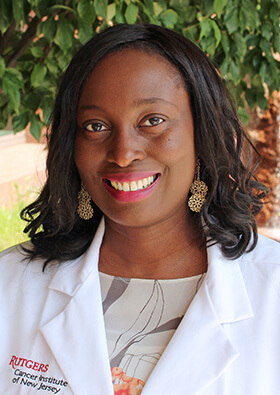October 28, 2021:
Coral Omene, MD, PhD, a medical oncologist at Rutgers Cancer Institute of New Jersey, was recently appointed as a co-chair of the Big Ten Cancer Research Consortium’s Breast Cancer Clinical Trial Working Group. She joins Sneha Phadke, DO, a medical oncologist at the University of Iowa Holden Comprehensive Cancer Center, in leading the working group.
Dr. Omene serves as assistant professor of medicine at Rutgers Robert Wood Johnson Medical School. Her research focuses on triple negative breast cancer (TNBC), which is among the most aggressive breast cancers, especially among African American women.
A native New Yorker, Dr. Omene received her MD and PhD degrees from Columbia University and completed her residency at New York Presbyterian – Columbia. She also completed a fellowship at New York University School of Medicine, NYU Langone Medical Center.
Dr. Omene has been active with the Big Ten Cancer Research Consortium (Big Ten CRC) since she joined the Rutgers Cancer Institute in 2017. She is the site principal investigator for two Big Ten CRC studies: BTCRC-BRE15-024, a phase I/II, single arm, non-randomized study of ribociclib (LEE011), a CDK 4/6 inhibitor in combination with bicalutamide, an androgen receptor (AR) inhibitor, in advanced AR+ triple-negative breast cancer; and BTCRC-BRE16-042, a phase II study of pembrolizumab plus fulvestrant in hormone receptor positive, HER-2 negative advanced/metastatic breast cancer. On the latter study, led by Rutgers Cancer Institute, Dr. Omene works closely with sponsor-investigator, Nancy Chan, MD.
The opportunity to collaborate with both junior and senior colleagues across institutions is a distinctive component of Big Ten CRC research studies. As a mid-career investigator, Dr. Omene welcomes her role as a mentor to early-career investigators while continuing to seek input from her colleagues.
“I don’t think we ever stop needing mentors who can guide us as we progress through our careers,” Dr. Omene said.
Dr. Phadke agreed. “It’s really been instrumental in my career development. Having mentors outside of your institution allows you to see how things are done elsewhere, and you have almost twice the support and twice the number of people who can help with things like statistics and research coordination,” she said.
Dr. Phadke and Dr. Omene share common goals for the working group:
- facilitating junior-senior PI mentorship,
- increasing investigator participation in the working group across all member institutions, and
- increasing the number of study concepts brought to the working group.
The co-chairs said they especially encourage junior investigators to submit research concepts and to reach out via email to share their ideas, so they can introduce their concept during a working group meeting.
“That’s what happened with me,” Dr. Omene recalled. “With my proposals, we went back and forth by email, and that helped build my confidence and a good foundation for the proposals.”
She said her experience with the Big Ten CRC has been very positive.
“What strikes me is the accessibility and collegiality of the group, and how easy it is for one’s ideas to propagate and to be fostered, especially for a junior investigator,” she said. “Because of the senior-junior pairing that we facilitate, you’re likely to be mentored well within the Big Ten CRC.”
In addition to the Big Ten CRC’s strong record of mentorship, Dr. Phadke notes that the structure of the consortium allows for greater efficiency in opening and completing clinical trials.
“The opportunities we have for networking and collaboration among our smaller group of investigators, as compared to larger national groups, allows us to more quickly open investigator-initiated studies across multiple sites,” she said. “This, in turn, allows us to more quickly reach our goal of improving outcomes for our patients.”
The co-chairs welcome all interested investigators and scientists from Big Ten CRC member institutions, including junior faculty and fellows, to join the Breast Cancer CTWG.
About the Big Ten Cancer Research Consortium: The Big Ten Cancer Research Consortium was created in 2013 to transform the conduct of cancer research through collaborative, hypothesis-driven, highly translational oncology trials that leverage the scientific and clinical expertise of Big Ten universities. The goal of the Big Ten Cancer Research Consortium is to create a unique team-research culture to drive science rapidly from ideas to new approaches to cancer treatment. Within this innovative environment, today’s research leaders collaborate with and mentor the research leaders of tomorrow with the unified goal of improving the lives of all patients with cancer.
About the Big Ten Conference: The Big Ten Conference is an association of world-class universities whose member institutions share a common mission of research, graduate, professional and undergraduate teaching and public service. Founded in 1896, the Big Ten has sustained a comprehensive set of shared practices and policies that enforce the priority of academics in the lives of students competing in intercollegiate athletics and emphasize the values of integrity, fairness and competitiveness. The broad-based programs of the 14 Big Ten institutions will provide over $200 million in direct financial support to more than 9,800 students for more than 11,000 participation opportunities on 350 teams in 42 different sports. The Big Ten sponsors 28 official conference sports, 14 for men and 14 for women, including the addition of men’s ice hockey and men’s and women’s lacrosse since 2013. For more information, visit www.bigten.org

















Subscribe to the Big Ten CRC Newsletter X
X Facebook
Facebook YouTube
YouTube